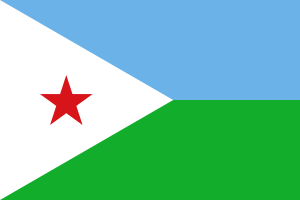Music of Djibouti
 |
| Part of a series on the |
| Culture of Djibouti |
|---|
| Culture |
| People |
| Religion |
| Language |
| Politics |
|
The music of Djibouti refers to the musical styles, techniques and sounds of Djibouti.
Overview
Djibouti is a multiethnic country. The two largest ethnic groups are the Somali and the Afar. There are also a number of Arab, Ethiopian and European (French and Italian) residents. Traditional Afar music resembles the folk music of other parts of the Horn of Africa such as Ethiopia; it also contains elements of Arabic music. The history of Djibouti is recorded in the poetry and songs of its nomadic people, and goes back thousands of years to a time when the peoples of Djibouti traded hides and skins for the perfumes and spices of ancient Egypt, India and China. Afar oral literature is also quite musical. It comes in many varieties, including songs for weddings, war, praise and boasting.[1] Somalis have a rich musical heritage centered on traditional Somali folklore. Most Somali songs are pentatonic; that is, they only use five pitches per octave in contrast to a heptatonic (seven note) scale such as the major scale. At first listen, Somali music might be mistaken for the sounds of nearby regions such as Ethiopia, Sudan or the Arabian Peninsula, but it is ultimately recognizable by its own unique tunes and styles. Somali songs are usually the product of collaboration between lyricists (midho), songwriters (laxan), and singers (codka or "voice"). Balwo is a Somali musical style centered on love themes that is popular in Djibouti.[2]
The national anthem of Djibouti is "Djibouti", adopted in 1977 with words by Aden Elmi and music by Abdi Robleh.[3] "Miniature poetry", invented by a truck driver named Abdi Deeqsi, is well known in Djibouti; these are short poems (balwo), mostly concerning love and passion.[1] They perform music and dance from two of Djibouti's main ethnic groups (Somali, Afar), they feature regularly on Djiboutian radio and television shows and perform as representatives of Djiboutian culture around the world. This festival draws performers from all over the country, and live recordings of headliner acts have proved popular with international audiences. Among the best-known performers are the Dinkara and Aïdarous. The government sponsors several organizations dedicated to the preservation of traditional culture and dance.
Djiboutian traditional instruments include the tanbura, bowl lyre and oud.[4]
Notable Djiboutian singers
- Awaleh Aden
- Adan Farah Samatar
- Issa Aptidon
- Abdi Nour
- Said Helaf
- Xabiba Cabdillahi
- Hassan Wado
- Kaltoun Bacado
- Abdo Xamar Qoodh
- Abdiraxman Hadanteeye
- Casha Bisle
- Siciid Xamar Qoodh
- Mohamed Ali Furshed
- Adan Faarax
- Nimco Jaamac
- Houssein Hayle
References
- 1 2 "Djibouti - Culture Overview". Expedition Earth. Archived from the original on February 27, 2004. Retrieved September 28, 2005. - Website no longer exists; link is to Internet Archive
- ↑ Mohamed Diriye Abdullahi, Culture and Customs of Somalia, (Greenwood Press: 2001), pp.170–172.
- ↑ "Djibouti". National Anthem Reference Page. Retrieved September 28, 2005.
- ↑ Poché, Christian (2001). Sadie, Stanley; Tyrrell, John, eds. The New Grove Dictionary of Music and Musicians. xxv (2 ed.). London: Macmillan. pp. 62–63.
External links
- Waqal Music - Djibouti Music
- (French) Audio clips: Traditional music of Djibouti. Musée d'ethnographie de Genève. Accessed November 25, 2010.
- Audio clips - traditional music of Djibouti. French National Library. Accessed November 25, 2010.